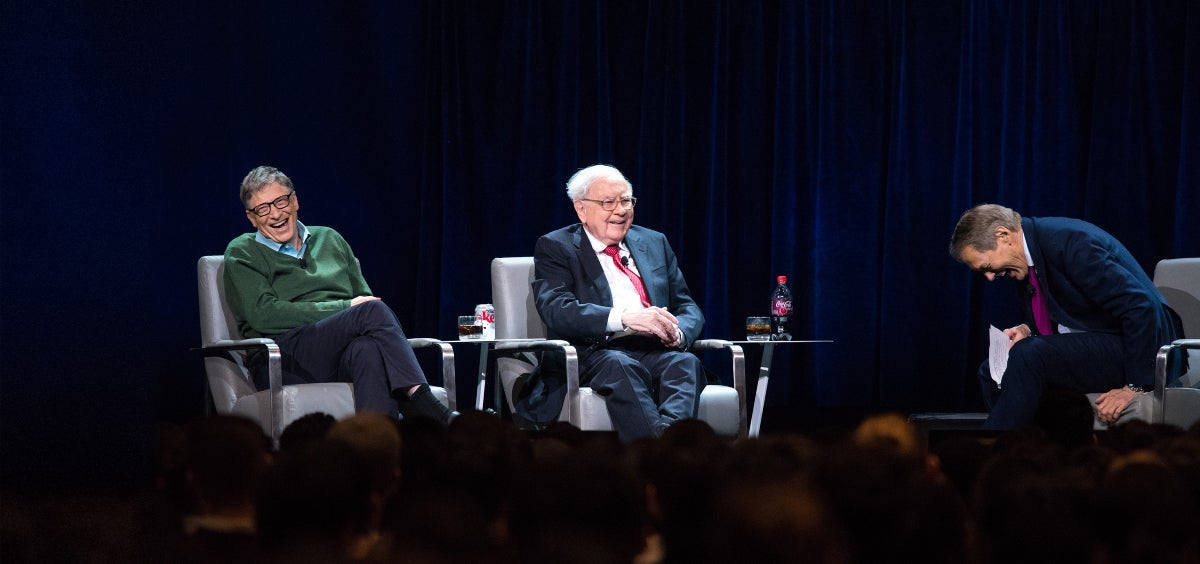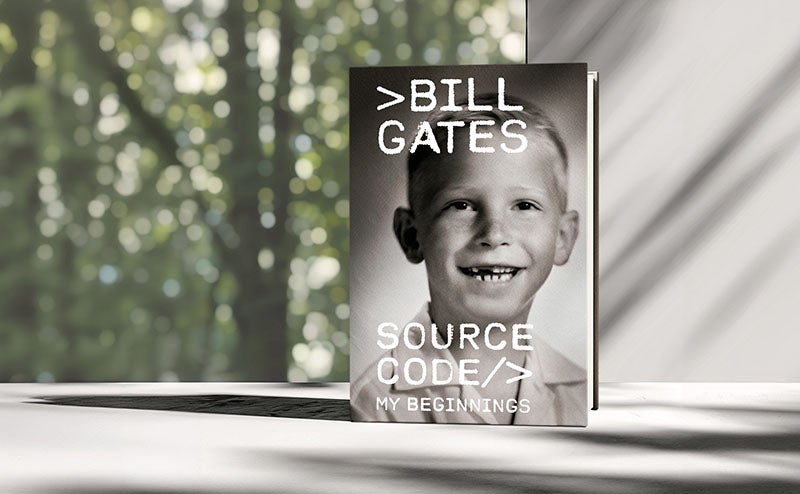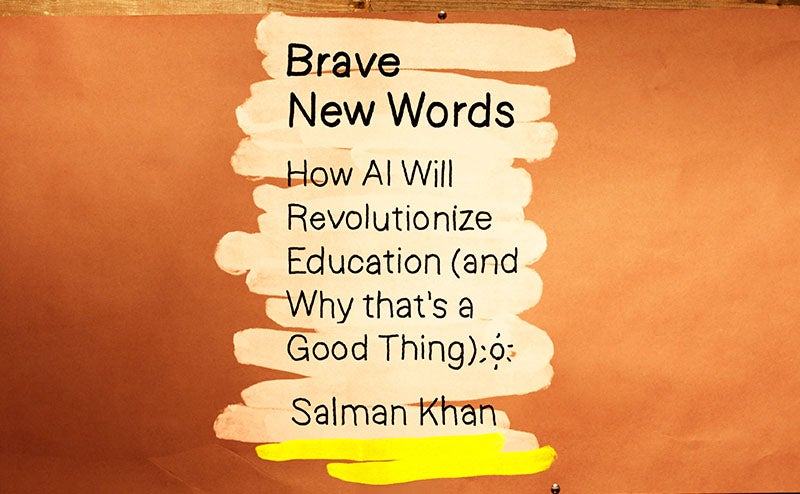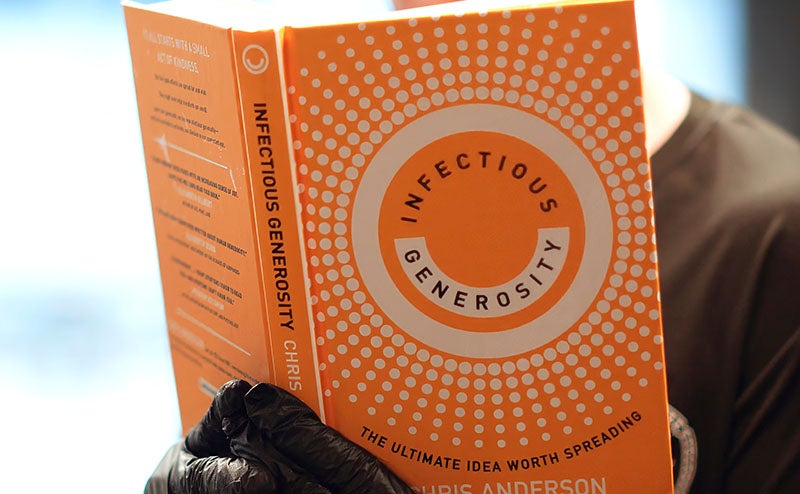What is the difference in cost between a given product that involves emitting carbon and an alternative that doesn’t?
Last week, I was in New York for a conversation with Warren Buffett at Columbia University. The event, moderated by Charlie Rose, combined two of my favorite things: meeting with college students and talking with my close friend, Warren.
Over the years, I’ve had the chance to speak with thousands of students at campuses across the country. Their youthful energy, passion, and curiosity are infectious and help fuel my optimism about our world. Likewise, Warren’s wit and wisdom are a national treasure. Just as he has done for the last 25 years of our friendship, he kept everyone in the room (and one million more on Facebook) learning and laughing.
Warren and I fielded a wide range of thoughtful questions touching on global health, fear of failure, education, innovation, business, our friendship, and books. If there was one underlying theme, it was our shared belief that despite what we may read in the headlines from day to day, the world is getting better and our best days are still to come.
Many thanks to Warren, Charlie, Columbia University, its students, Facebook, and thousands of people who watched the conversation online.
I encourage you to watch the entire conversation online. But here are a few of my favorite questions and excerpts of our answers.
Question:
What surprises you most about each other?
Warren:
That’s an interesting question. I guess what really surprised me initially is that we just found so many things to connect on. Bill did try to sell me a computer. That’s probably the only sale he didn’t make, although the computer changed my life for the better in a big way subsequently. But, he just had the same curiosity.
Bill:
I was so amazed that Warren comes to investing with this broad model of the world. So one of the first questions he asked me was, hey, Microsoft is a small company, IBM is this huge company, why can you do better? Why can’t they beat you at the software game that you’re playing? And I always—every day I was thinking about, okay, what advantage do we have, what do we do? But nobody ever asked me that question.
And we talked about the economics of software, which is a very different and special thing and he could relate it to things that he’d seen. And I didn’t understand banking, why some get ahead and some don’t. And so he was able to put that in very clear terms. And so I found somebody whose model was rich enough that it helped me understand things that I really wanted to know and we could laugh about things that were a surprise to us.
I’d say his humility and his sense of humor really stood out in this incredible way. I mean, he enjoys what he does and he shares that with other people. And even when I ask questions that are pretty naive, that he’s probably been asked 50 times, he’s very nice about it.
Question:
What are you both most hopeful and worried about in this new political environment?
Warren:
America will move ahead. When you look at what’s happened in this country over 240 years it’s an absolute miracle. I say the luckiest person in the history of the world is a baby being born today in this country. I bought my first stock when I was 11 in April of 1942. The DOW was 100. If you haven’t looked it’s 20,000. Something good must have happened between then and it’s going to keep happening, folks.
Bill:
Well, the optimism is partly that I think American innovation is strong, support for research is by and large bipartisan, and so whether it’s health breakthroughs or even energy breakthroughs, I think every year that goes by we’re going to have more of those things.
Now this Administration is new enough, we don’t know how their budget priorities will come out. There are things like foreign aid, which is a small part of the budget, about $30 billion a year, but that means the U.S. is the biggest, that every time there’s new leadership, we have to go in and articulate the benefits, it’s well spent, it’s not the image that people have in the past. And so right now, I think there’s a lot of intensity to make sure we get that message out and get, both in terms of the Executive Branch and the Congress to maintain amazing things like the President’s Malaria Initiative or PEPFAR, which is an HIV thing. These things started under President Bush. And so our Foundation has had a great working relationship with Democratic and Republican Administrations.
Question:
How did you both overcome your fear of failure?
Bill:
Well, I think I was very lucky that when I was in high school the computer was brought in there and I developed a fascination for it and became kind of fanatical about it so that I didn't view it as risky, I viewed it as this kind of hobby. But I think it’s great to be risk taking, particularly when you’re young, trying out different things, fields that aren’t very popular that you might enjoy.
Warren: Don’t fear failure. I got turned down by Harvard. It was the best thing that ever happened. There are some good things that happened that didn’t seem good at the time. Don’t worry about it. And don’t let it eat at you by looking back. Just keep going, because you’re going to have some things and forget them. Go forward.
Question:
If you were to do it all over again what industry would that be in? Where would you start your own business today?
Warren:
I’d do the same thing. For one thing, I’d be a failure at anything else probably. I had fun when I was in my 20s, my 30s, now I’m 86 and I’m having fun. So I advise students as much as possible, look for the job that you would take if you didn't need a job. I mean don’t sleepwalk through life and don’t say it’s all going to be great, I’ll do this and I’ll do that, and I’m just marking time to be older. As I’ve told people, that’s like saving up sex for your old age, it just is nuts. It is not a good idea.
Bill:
Well, I love the hard sciences and there are some phenomenal things that people will get a chance to be part of. I’d still probably pick computer science, because the work in artificial intelligence today is at a really profound level.
Question:
If the current government were to ask for your advice on immigration, what would you recommend to them?
Warren:
On immigration, this country is built on it. If you think about, we are sitting here in part because of two Jewish immigrants who in 1939 in August signed the most important letter perhaps in the history of the United States. Leo Szilard and Albert Einstein two immigrants came here directly from Germany (Szilard came from Hungary before that) and they told President Roosevelt that the Germans were likely to develop an atom bomb, which was likely to work and we'd better get to work on something fast. And the Manhattan Project came out of that. And if it hadn’t been for those two immigrants who knows whether we’d be sitting in this room. This country has been blessed by immigrants and you can take them from any country you want and they’ve come here and they’ve found something that unleashed the potential that the place where they left did not and we’re the product of it.
Question:
And your advice on healthcare reform?
Bill:
Well, there’s no doubt that in order to provide decent healthcare the percentage of GDP devoted to it is going to go up over time. It’s already very high, and yes there’s some efficiencies to be gained in that, 18 percent or so, number. But as society ages, as we come up with new things like joint replacement, organ transplant, which are going to create lots of human benefits, we’re going to have to have more resources overall, including more government resources for healthcare.
So it’s a tough problem because you have both access problems today, and you have cost problems today. And whenever I look at a problem, I have this one simple lens, which is innovation should help here, but in this case innovation, while it will provide breakthrough drugs that will save costs, like if you can cure Alzheimer’s, which we certainly haven’t done yet, that will save on huge long-term care costs.
So we have these chronic diseases that we’ve made less progress on than some of the others, and the market mechanism to get pharma to go after those things, and the basic research funds, I am quite optimistic that we'll have some advances. But they’ll also give us some very expensive things that will mean we're spending more money against it.
And I do hope that at some point that we really are calling on the best minds to look at the incentives for the breakthroughs, the most efficient system we have here. I think there’s a lot of unhappiness in the country now that stems from the fact that the healthcare system isn’t delivering, and yet people are saying less government, more government. I don’t think they’ve been given the depth of education about why it’s so tough that over time will help them vote for the right solution.
Question:
You both have invested a great deal of money abroad, but there are pressing issues in America. There are poor people here, there are sick people here, and we should deal with that first before even tackling anything abroad. What are your thoughts on that?
Warren:
My own personal thought is that every life is of equal value. And in many ways if you have a limited number of dollars, you actually can do more for more people outside the United States. And we do have greater resources here for our 320 million people than exists around the world for 7-plus billion people. So you can improve the lot of more people by intelligently spending a billion dollars, or any other number, in other areas of the world actually than here.
Coming from Omaha and having the money I have, people can say, well, why not spend it all in Omaha. You grew up here and Omaha has done all kinds of things for you. And I absolutely acknowledge that. But in the end, if I’ve got X dollars to spend, I can make life better for more people if I can have it intelligently allocated in other parts of the world actually than the United States. And that draws a fair amount of criticism, but I live with it because it’s what I believe.
Bill:
In terms of helping people in other countries, the foreign aid budget of the U.S. is .8 percent of the budget. And there will be in the years ahead a discussion about is that worth doing. And in terms of stability and countries eventually being self-sufficient to be part of the world economy, there are some huge benefits to that.
So if we were talking about should we spend 20 or 30 percent overseas, okay, that would be a very interesting discussion. But what we’re trying to preserve is something that’s gotten smarter and smarter all the time, has proven benefits, all of which are things that our Foundation co-invests and invests in the same things, like polio. So I’m hopeful that in a big world that can remain a priority.
Question:
Are there any major life lessons that you two have learned about relationships through your personal experiences?
Warren:
Well, it’s a very important question. You will move in the direction of the people that you associate with. So it’s important to associate with people that are better than yourself and actually the most important decision many of you will make, not all of you, will be the spouse you choose. And you really—you want to associate with people who are the kind of person you’d like to be. You’ll move in that direction. And the most important person by far in that respect is your spouse. I can’t overemphasize how important that is. And you’re right, the friends you have, they will form you as you go through life and make some good friends, keep them for the rest of your life, but have them be people that you admire as well as like.
Bill:
Some friends do bring out the best in you and so it’s good to invest in those friendships. And some friends challenge you about things you’re doing and that level of intimacy is great. It’s really through Melinda and seeing other people I realized, okay, it’s really worth the investment to have those people, as you’re always there to help them and vice versa.





